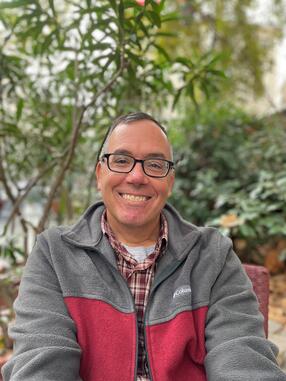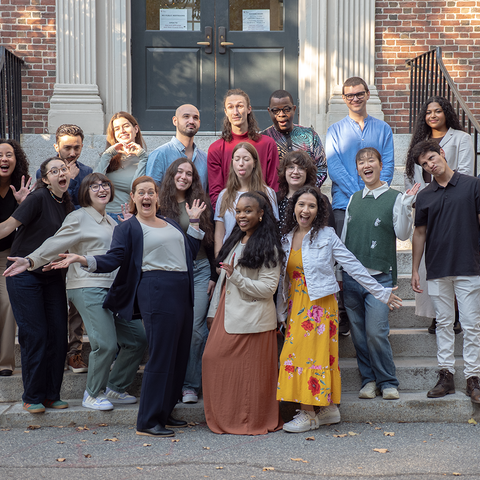Aid and Support
Curcio brings empathy and a teaching mindset to new role of financial aid director
Tony Curcio joined the Harvard Kenneth C. Griffin Graduate School of Arts and Sciences (Harvard Griffin GSAS) in January as the School’s inaugural director of financial aid. With over 30 years of experience in his field, Curcio comes to Harvard Griffin GSAS from Harvard Law School (HLS) where he was associate director of financial aid from 2006 to 2023. There, he was known as an innovator who developed a technologically integrated financial aid system for law students. In this interview with the Office of Communications, Curcio talks about his hopes for making financial aid at Harvard Griffin GSAS more efficient and effective, the financial challenges that confront students, and the need to keep graduate education at the University accessible to all.
After such a long and successful career at HLS, what attracted you to the opportunity to be the inaugural director of financial aid at Harvard Griffin GSAS? What most excites you about this role?
What was nice about the job at the Law School was that there was always something new to learn. It was always changing.
In a way, that’s what drew me to the job at Harvard Griffin GSAS when it opened. It seemed so different and exciting, so much new to do and learn. It was also a chance to be a pioneer and essentially define how an important new position should work. Finally, I think [Harvard Griffin GSAS Dean for Admissions and Financial Aid] Bob Coughlin is a great leader. He’s been in the field for a long time. I first met him early on in my career at Harvard, and we kept in touch over the years. So, I was excited about working with him and serving a new population of students in a larger office.
You've worked in financial aid for more than a generation. What are the top concerns you've heard from students over the years when it comes to financing their education?

The ones that come to mind are concerns about how to understand debt and think about financing an education in the context of a student’s long-term financial future. Students come to school with this intense passion for what they want to study. But they also have to deal with the financial side of graduate education, which can be stressful, sometimes intensely so. Throughout my career, I’ve tried to help students step back and get perspective. Most aren’t experts in finance, and they don’t have to be. It's our job to be empathetic, to understand who they are and why they're here, to support them, and to help them learn.
One very important thing is to present options. Early in my career, the tendency in financial aid was to say, “No, you can't do that. And here's why.” It may have been true, but that kind of response to stressed-out and frustrated students doesn’t always connect. Now, it's more about saying, “Okay, I understand your situation. I see what you're struggling with. Your first choice may not be possible but here are some other options.” Now, they may not all be options the student wants, but it’s our job to give them a path, some way out of whatever crisis or situation they’re in.
What do you see as some of the key challenges in your new role, and how do you hope to address them?
Well, the financial aid landscape is very different at Harvard Griffin GSAS. Stipends and grants don’t really exist at the Law School in the way they do here. There are some, but financial aid at HLS mostly consists of educational loans.
Students in the humanities and social sciences, whose time to degree is often longer than five or six years, have financial concerns in the gap years before graduation similar to those of students at the Law School. Here, though, students are very reluctant to borrow. There are good reasons for that. The academic job market is tight, which can make their future earnings a little uncertain particularly in the early years of their career.
One challenge that applies across the board is managing the cost of living in the Boston area. It’s a lot to ask students to live super frugally for six, seven, eight years. They might want to get married. They might even want to have kids. It’s a long time in someone’s life. We’ve increased the graduate stipend, which is great, but it’s still important that our students know how to budget, how to manage money, and how to make it last.
What innovations or best practices from your time at HLS do you hope to bring to this new role to help streamline processes and deliver aid to students?
I'm very operational and efficiency-minded. I like to use technology. The more efficiently we can do the tasks of the day, the more time we have to spend with students one-on-one.
I'll give you an example from my time at the Law School. We didn't do as many stipends as Harvard Griffin GSAS, but we did a lot of refunds for students who got financial aid in excess of their tuition and fees. That used to be a manual process. Students had to fill out paperwork. Staff would go and compare the term bill system to the financial aid system and then calculate manually what the student should get as a refund.
Now, we got established data feeds from my.harvard or, before that, the SIS system. There was a lot of information about student balances and things like that. So I mapped that data to PowerFAIDS, which is a financial aid system. It was a limited set of data, but it had the key things that we needed to know—for instance, which students had credits on their account—and we loaded them every day. We set up a process to export automatically right out of PowerFAIDS in the right format to be able to issue refunds to students rather than doing them one at a time. That’s the kind of thing I’d like to do at Harvard Griffin GSAS—to make processes less time-consuming for people.
Finally, as costs of living in the Boston area continue to rise, how can the Office of Financial Aid work with students to ensure that a Harvard education remains accessible?
I think the stipend increases that Dean Dench announced last fall are going to help a lot. It’s a big win for students.
Beyond that, I think we have to have a teaching mindset. We can't assume that students come to Harvard with knowledge of how to navigate budgeting and be mindful of their financial choices. And we have to stay away from judging people. Choices are personal. They’re subjective. Saying things like “You don't need this,” can put people off.
We must try to help students see that the financial support here is generous, but it’s fixed. Within those limits, students have choices. It’s our job to help them think about what their needs are and how to prioritize them—particularly master’s students and PhD students in their gap years. It’s expensive to live in the Boston area, no question. We’ll do all we can to help students navigate financial challenges so they can complete their degree program and achieve their goals.
Get the Latest Updates
Join Our Newsletter
Subscribe to Colloquy Podcast
Simplecast





